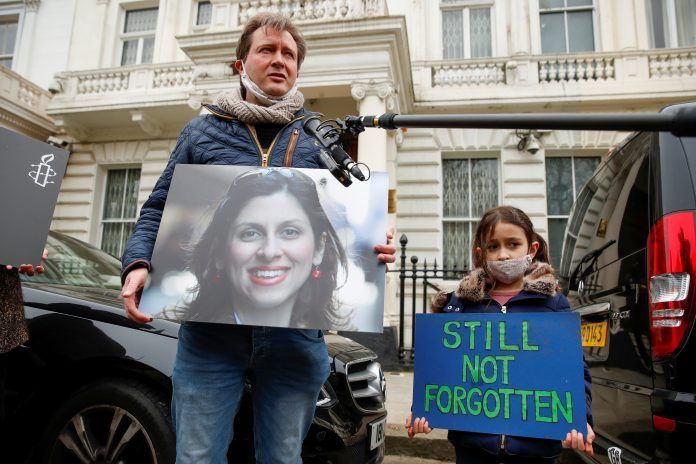
A British court has postponed hearings due to take place in April on the $550 million that the U.K. owes Iran, potentially complicating the release of the detained British-Iranian Nazanin Zaghari-Ratcliffe.
The High Court hearings about the debt, which were scheduled to take place in April, have been indefinitely postponed. A postponement can only be granted if all parties to the case agree. Asked who requested the postponement and why it was agreed to, a UK government spokesperson told Kayhan Life: “The adjournment of the April hearings is at the request of Iran’s Ministry of Defense. We continue to explore options to resolve this 40-year-old case, and will not comment further, as legal discussions are ongoing.”
The lawsuit between Iran’s Ministry of Defense (MODSAF-IR) and the UK’s International Military Services (IMS) arises from the sale of tanks by Britain to Iran before the Islamic Revolution. The money was received, but the tanks were never delivered.
The dispute centers around the interest owed on the debt, and on attempts by Iran’s government to secure the transfer of the principal sum to its accounts. The sum cannot be released by the British government while U.S. and UK sanctions on Iran remain in place.
Speaking to Kayhan Life, Zaghari-Ratcliffe’s husband, Richard Ratcliffe, said the British government owed its unjustly detained citizens in Iran a duty of care, which it was ignoring to avoid paying the debt.
“The postponement is devastating news. This experience is torture for Nazanin, and myself. The UK is clearly trying to minimize the leverage against it, and it’s also trying to disconnect the issue of the debt with Nazanin’s detention,” he said. “At the same time, Iran is pushing for an out-of-court settlement, and it keeps postponing the court hearings, and then it keeps squeezing some hostages to make it clear to the UK that it needs to do something.”
Following the postponement of the debt case, several detained dual nationals were summoned by Iran’s judiciary to attend court hearings in Iran on April 28, including a British citizen, Mehran Raoof.
Mr. Raoof, a 64-year-old labor rights activist, was arrested in Iran on Oct. 16 for peacefully protesting against workers’ conditions in the country. Mr. Raoof has been kept in solitary confinement for more than 180 days in ward 2A of Evin prison.
Prison officials have stopped Mr. Raoof from making telephone calls to immediate family members who live outside of Iran, and have denied his right to legal assistance. Daren Nair, an advisory board member for the Washington-based NGO, Hostage Aid Worldwide, confirmed Mr. Raoof’s trial date in a tweet posted on April 22, and called on the British government to ensure a representative from the British Embassy in Iran was present at his trial.
A statement issued by the Free Nahid campaign on April 21, said that German-Iranian Nahid Taghavi, a 66-year-old retired architect, had also been asked to attend Iran’s Revolutionary Court on the same date, having been held for more than six months in pre-trial detention in Evin prison without access to her lawyer. Ms. Taghavi has spent nearly all of those six months in solitary confinement and has been denied access to medication for her high blood pressure.
German-Iranian’s Detention in Tehran Violates International Law, Says German Lawmaker
Meanwhile, in a ClubHouse event on April 20, Iran’s Foreign Ministry Spokesman Saeed Khatibzadeh suggested an “all for all” prisoner exchange in which dual nationals detained in Iran and Iranians imprisoned abroad would be simultaneously released. The comments coincided with preparations for the next round of Iran nuclear deal talks in Vienna.
Patrick Wintour, the diplomatic editor of The Guardian newspaper, told Kayhan Life that while Tehran seemed content to let the case in London continue on, the nuclear talks in Vienna could pave the way for the release of detained dual nationals in Iran.
“[The postponement] was predictable, but I think it just devastates the families because they’ve pinned their hopes on [the case],” he said.“The Vienna negotiations would allow the lifting of U.S. sanctions withholding the payment to go ahead in theory, so in a way the case can be better settled through talks in Vienna.”
He noted, however, that “those negotiations may take quite a while.”
Human rights organizations have called on the U.S. and the EU to place all unjustly detained dual nationals in Iran at the heart of the negotiations. In a press statement issued on April 20, the New York-based Center for Human Rights in Iran (CHRI) called on the West to form a united front to ensure that the release of dual nationals was prioritized during the negotiations. CHRI said there were 14 dual nationals currently detained in the country.
Ratcliffe said he would be meeting UK Foreign Office officials in the coming days to discuss the debt case postponements’ impact on the lives of British citizens. He said three deadlines had now passed without “any positive result” with respect to the end of his wife’s sentence. The final one was the U.K. court hearing.
The U.K.’s IMS said in its annual report published on April 8 that the case “had been adjourned 10 times to date, mostly at the instigation of MODSAF-IR, although IMS did agree to many of the adjournments based on MODSAF-IR’s stated aim of securing a negotiated settlement.”
IMS added that there was a “high risk” and “high probability” of the case being drawn out, “given the MODSAF-IR appetite to prolong the dispute through the legal appeal process” and that not defending the litigation was not an option for the military body.
The report also said IMS’s costs rose nearly fourfold from 2019 to 2020 — from $565,000 to $2.2 million — an increase largely caused by legal costs associated with the court case.
Iran Hostage Release Must Be Part of Nuclear Deal, Richard Ratcliffe Says

